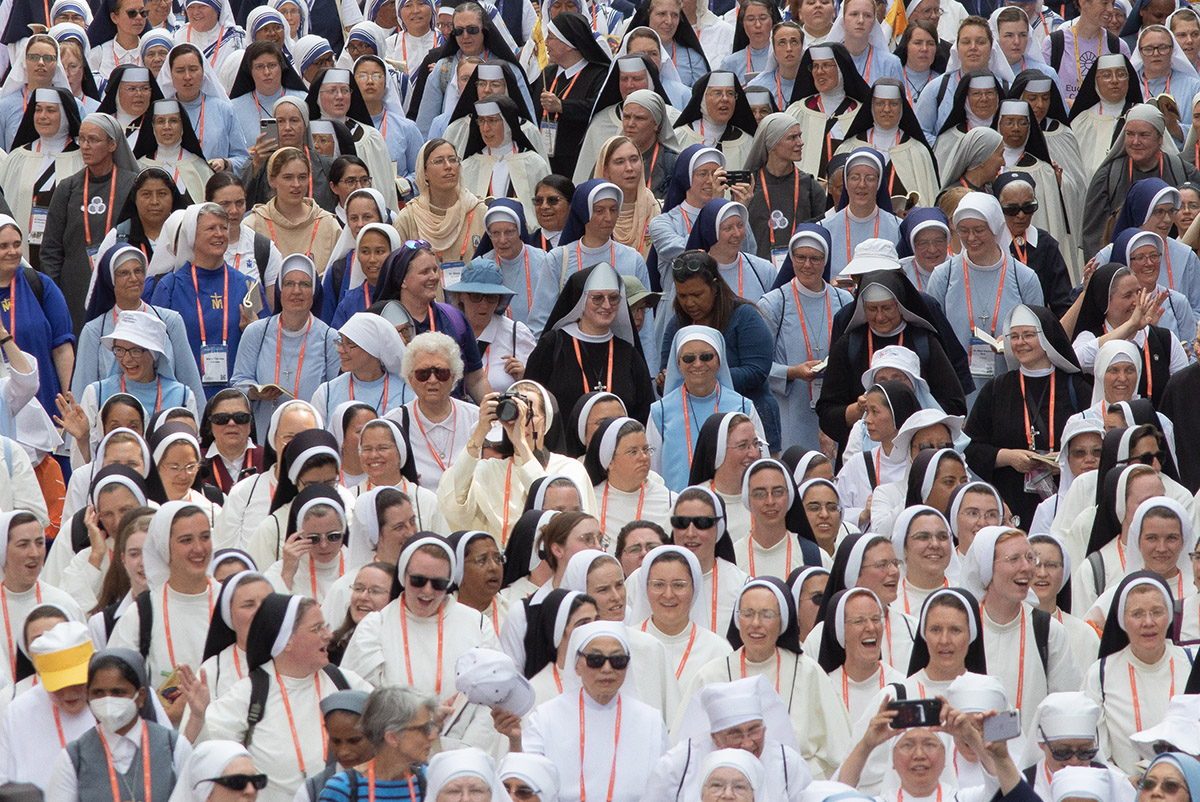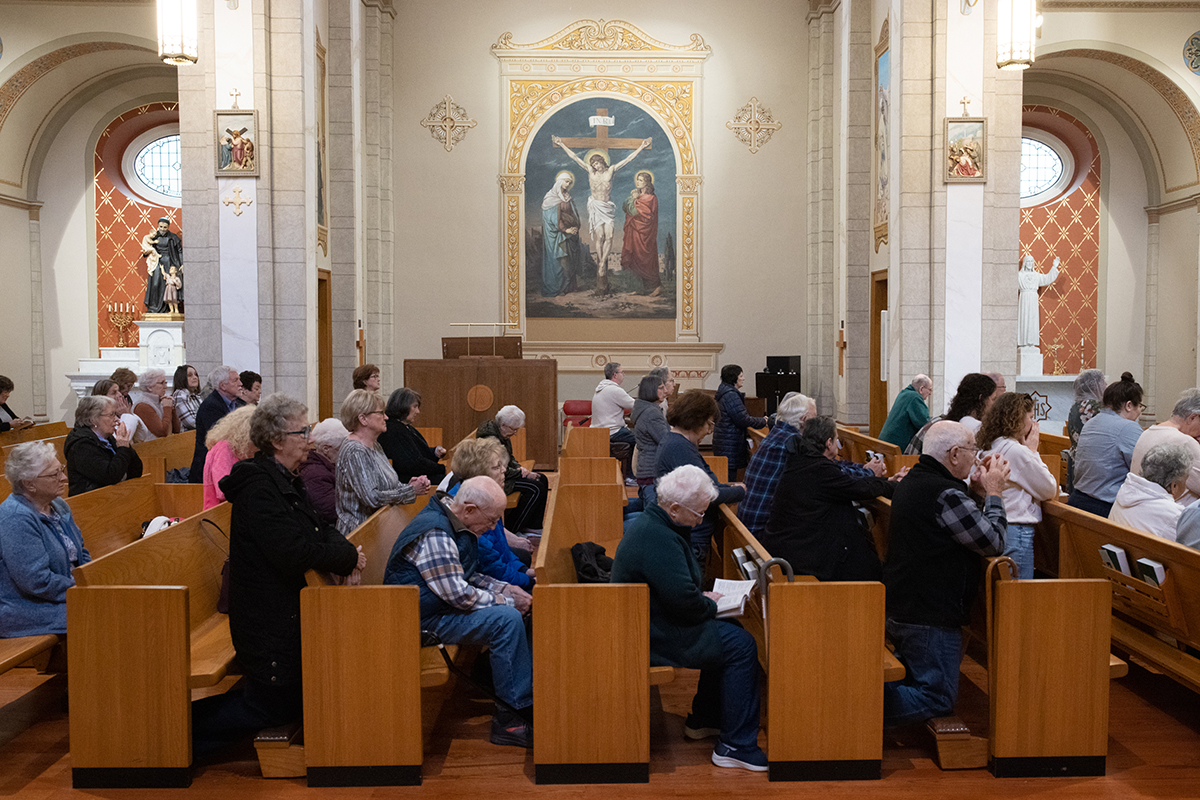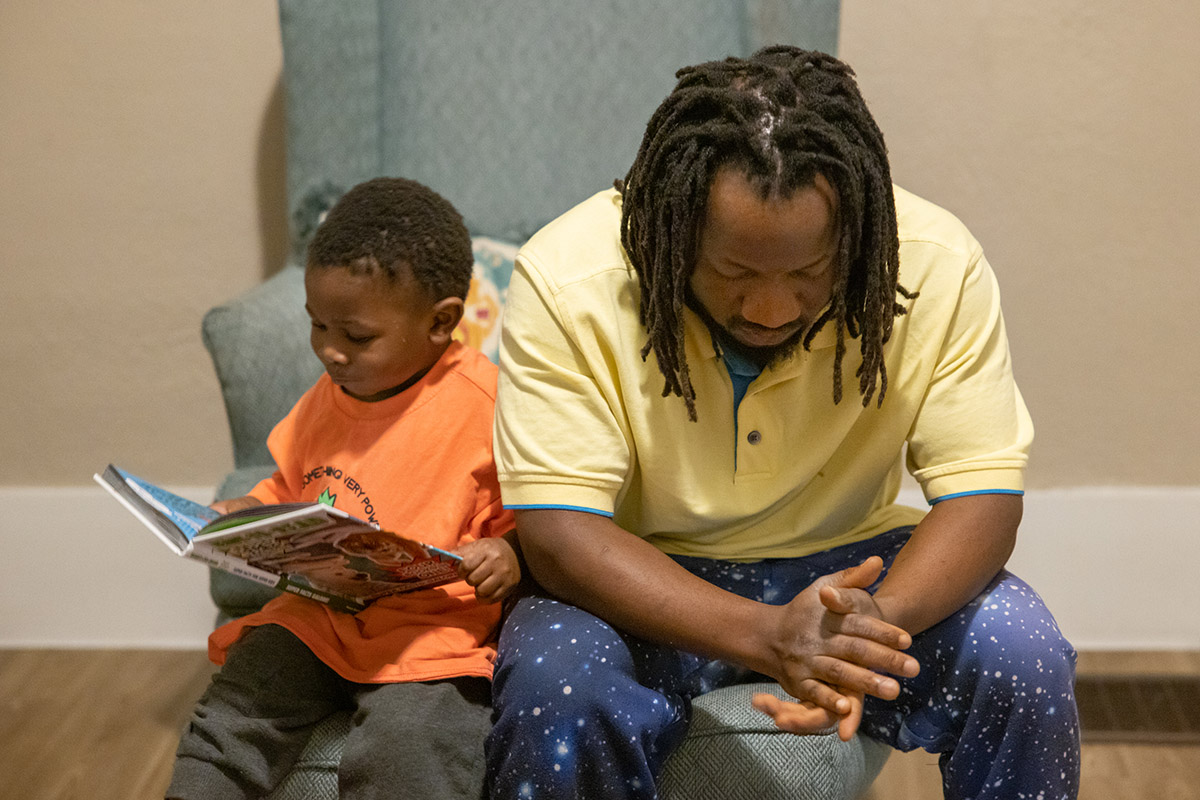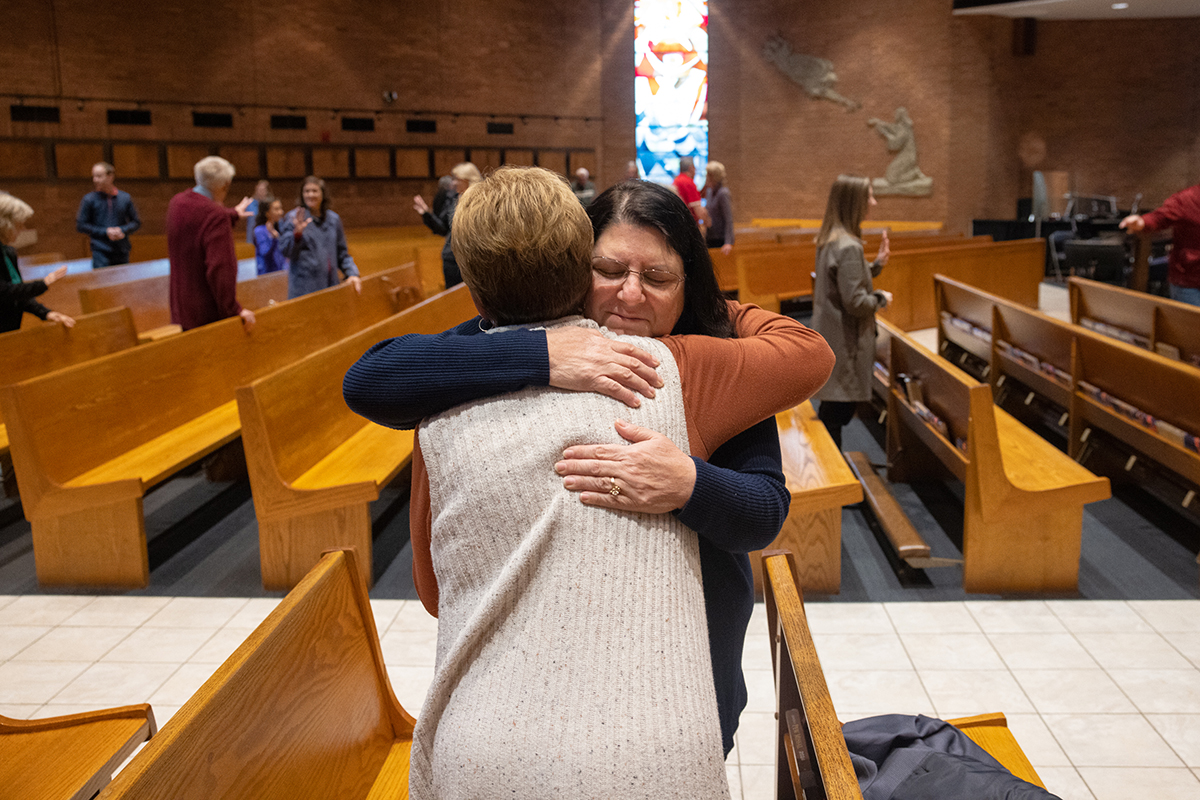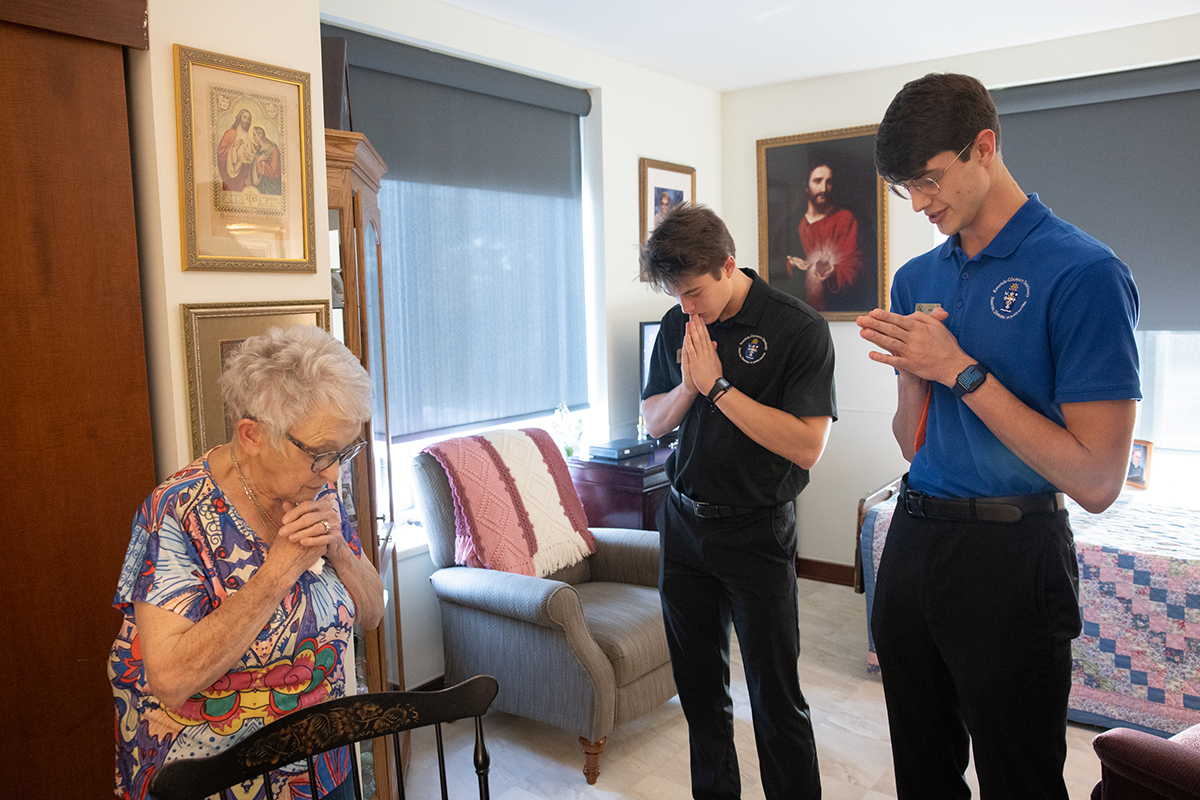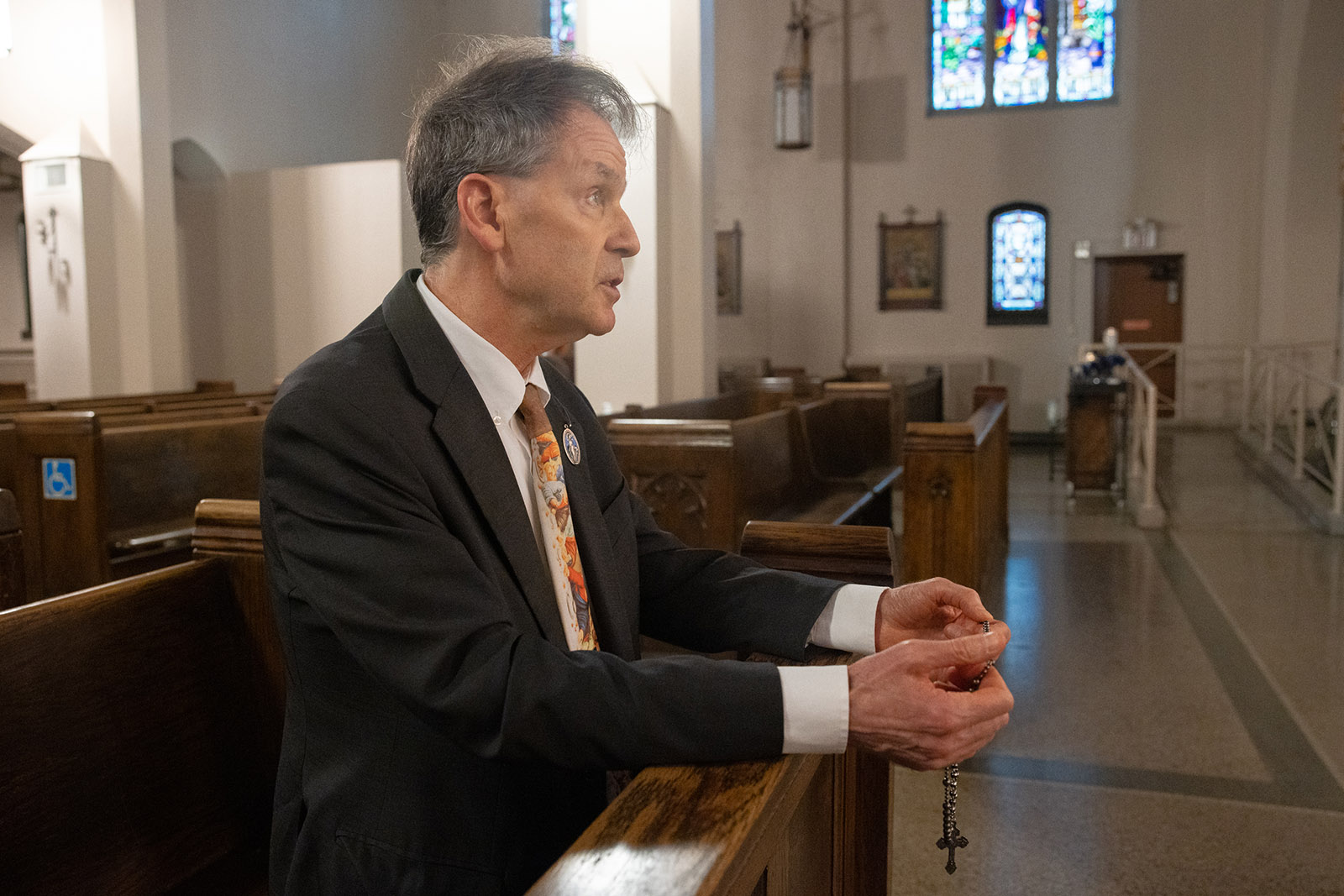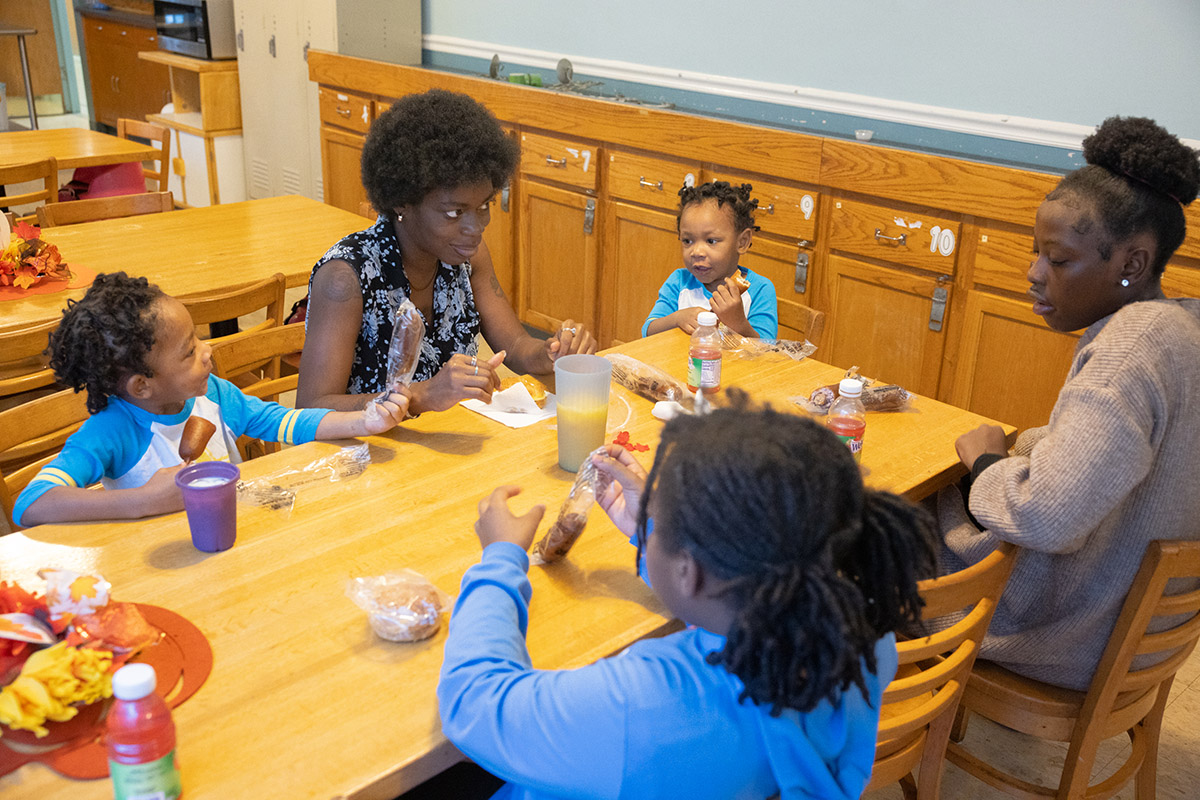Health care workers find the presence of God through pastoral, spiritual care in midst of pandemic
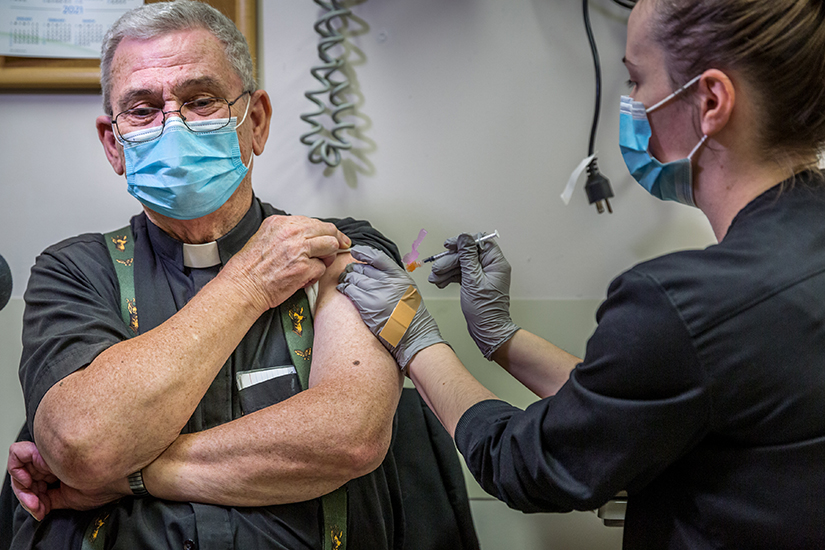
In the midst of a pandemic, health care workers find comfort, solace in pastoral and spiritual care for themselves, patients
At the start of every workday, Diane Brunts takes a deep breath as she looks over her schedule. The palliative care nurse at SSM St. Clare Hospital in Fenton finds comfort in saying a surrender-to-Jesus prayer. It’s one of the coping techniques that she uses to hold herself up, so that she may hold up others in the last moments of their lives.

Hospital employees spend a lot of time lifting each other up, said Brunts, a member of St. Francis of Assisi Parish in Oakville. “It’s both exhausting and sad to go through that day in and day out,” she said. “You feel like it’s the saddest Groundhog Day ever. It’s important to help each other out and to make sure that we’re OK. It’s very much like a family.”
Brunts said some of the COVID-19 patients she’s seen who have died don’t always fit within high-risk categories. “I said goodbye today to a 55-year-old,” she said. “I had a 61-year-old last week and a 54-year-old. It’s not always the unhealthy. It’s really odd how it’s so unpredictable.”
Health care workers rely on their “oasis” — pastoral care for mental and spiritual support. St. Clare chaplain Paul Miller said the three-member pastoral care team have had to shift their approach since the hospital moved to a no-visitors policy, including volunteers, during the pandemic.
Their ministry has included making phone calls to patients in their rooms or to family members. With staff, conversations can be impromptu encounters on the floor or by request with pastoral care. Each floor also has a meditation room in which patients and staff can use for quiet prayer or reflection.
“They’re under a lot more stress and pressure,” he said. “They’re saddened by the fact that a lot of people can’t see their families, and being overworked and having the concerns our society has about the pandemic.”
Registered nurse Theresa Dempsey carries a small daily devotional book in her purse. She absorbs passages on those days when she feels like the work is overwhelming. With the release of a COVID-19 vaccine, Dempsey said she feels like there is a light beginning to emerge at the end of a tunnel.
“You see people who are dying every day and it’s frustrating to see people not taking this seriously,” she said. As a Christian, she relies on her faith along with moments of self-care — such as putting up the Christmas lights extra early this year — to get through the tough moments. “I don’t know how people without faith are getting through this,” she said.
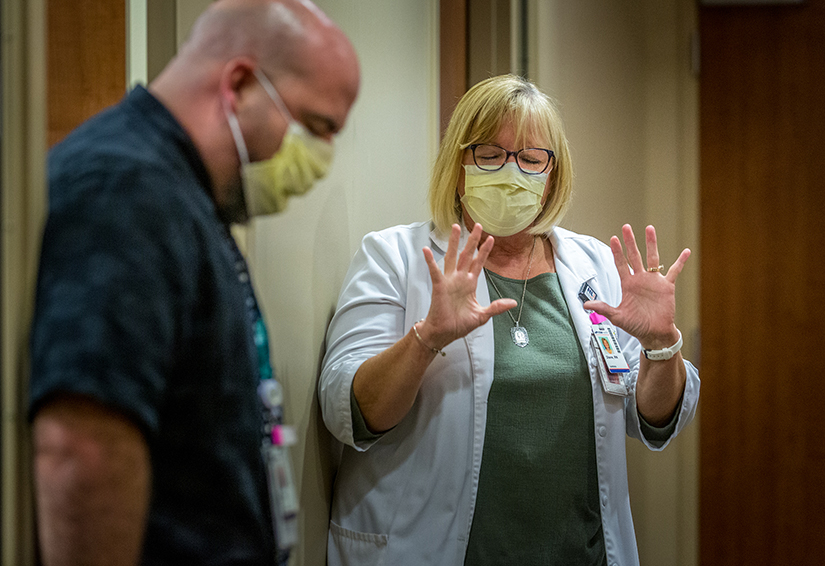
Pastoral care

In her 38 years of health care work, Karen Gist has seen many moments that hurt the heart and the soul.
Gist joined Mercy Hospital South as director of emergency services nearly a year ago. With oversight of the hospital’s emergency department, she has witnessed a range of issues — anything from broken bones to patients whose bodies have been ravaged by the coronavirus.

With stricter limitations on visitors because of the pandemic, health care workers on the front line often step in to provide the extra comfort a family member would otherwise give. They also find the support of pastoral care workers, with chaplains offering a calm and comforting presence to patients and staff.
“When we have a critical patient, pastoral care and the chaplains show up — they are here,” Gist said. “They support the team as well as the family and the patient,” she said. People who work in the emergency department, “they’ve got to have this tough exterior. But they really appreciate those moments and they’re sacred.”
With virus cases remaining at extremely high levels in the St. Louis area and across Missouri, the pressure placed upon health care workers has not eased since the pandemic came to the area nine months ago. Missouri has nearly 375,000 COVID-19 cases, with 4,754 deaths across the state, according to data released in mid-December by the Missouri Department of Health and Senior Services.
The St. Louis Area Pandemic Task Force on Dec. 15 reported there were 920 virus patients across facilities with BJC HealthCare, Mercy, SSM Health and St. Luke’s Hospital. Hospitals were operating at a capacity of 84% among staffed beds, and 85% of capacity with intensive care units. On Dec. 14, hospitals in St. Louis started the process of vaccinating staff with a vaccine against COVID-19.
Despite the added pressure, employees are taking physical precautions so they may continue to provide the same level of care to patients as they’ve always had. Within several Catholic hospitals, health care workers have said the pastoral and spiritual care they receive also makes a difference in the work they do.
Jeannine Celestine, a respiratory therapist at Mercy Hospital South who was among the first employees to receive the COVID-19 vaccine Dec. 14, said she leans on the hospital’s pastoral care department for prayer resources on difficult days.
“I work in the ER, so I am in a lot of emergencies and traumas,” Celestine said. “I find it very comforting when pastoral care shows up to those situations. And they’re not just there for the family but us, too. They always have a very calming presence there.”
Healing ministry of Jesus
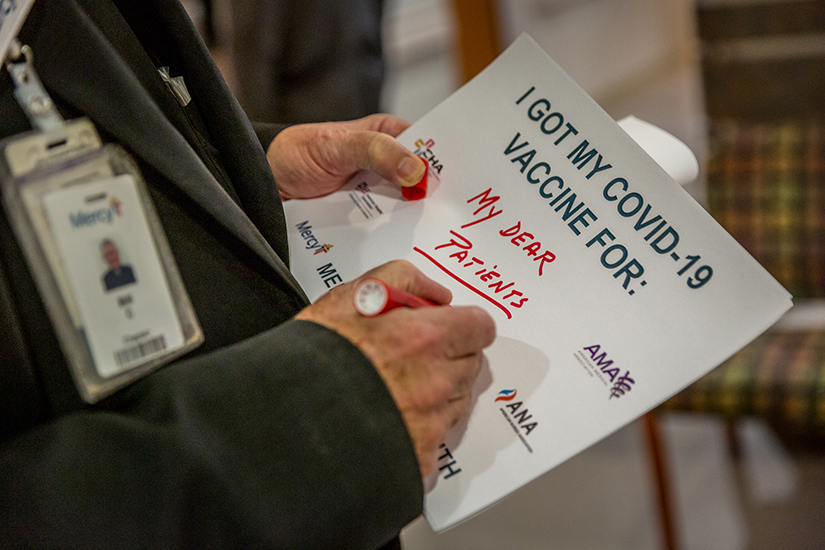
In the lobby at Mercy Hospital South, a sign greets visitors: “May God protect our patients and co-workers and keep them safe.” Smaller notes representing COVID-positive patients who were discharged from the hospital line the walls.
The presence of God is often felt within the walls of the hospital, said Chuck Rosso, a 16-year chaplain at Mercy South. Since the start of the pandemic, the hospital has increased the number of prayers said over the public address system throughout the day, Rosso said. Several units have “serenity” rooms, a quiet place where employees can break away from the work for several minutes to rest, reflect or pray in the comfort of a massage chair.
“When this started in the spring we were going to unit huddles and offering prayers for the teams as they were starting to deal with COVID,” said Rosso, one of six chaplains at Mercy South and a member of St Ann Parish in Normandy. Pastoral care staff have shared resources on using prayer as a coping mechanism, along with simple mental health techniques for coping with stress.
Other resources for employees include regular webinars in collaboration with the hospital’s Employee Assistance Program on specific topics such as resiliency, said Mary Beth Bulte, vice president of mission integration at Mercy South. “We met with our nursing leaders of these primary COVID areas … and said, ‘What are your people needing?’ One of them was, ‘I’ve got to have a space to step away.’”
Ask just about any health care worker how they are taking care of themselves, and they’re more than likely to turn the conversation to their patients’ needs. Sister Maria Maranan, an Apostle of the Sacred Heart who serves in a dual role as a registered nurse in acute rehab and part-time volunteer with pastoral care, said she finds joy in bringing Communion to patients — many of whom have not received the Eucharist in months because they’ve avoided attending Mass in person because of health concerns.
Sister Maria has changed how she interacts with patients since the pandemic began. “On our floor, we can’t have visitors. So as pastoral care, I am an added person a patient can talk to. In one of the rooms today, I had a patient talking to me — she just needed somebody there, because they can’t have visitors. I am a moral and spiritual support for them.”

A light at the end of the tunnel
On Dec. 14, several dozen employees at Mercy South received the first doses of the Pfizer-BioNTech vaccine. It was a jubilant moment, as they cheered for their colleague Dr. Aamina Akhtar, an infectious disease specialist and the hospital’s chief medical officer, as she received the vaccine in front of journalists. The four-state Mercy system expects about 24,000 doses in its first distribution. SSM Health is expecting its first doses of the vaccine within the week.
Ben Ojie, a registered nurse in medical surgical unit, was another employee who received one of the first COVID-19 vaccines Dec. 14 at Mercy South. He said he likes hearing the prayers announced throughout the hospital every day. “They’re relatable personal prayers, praying for strength for me and the patients,” he said. “The leadership of the hospital, they go around the hall checking out how we’re doing, providing snacks. They ask questions, like how are you feeling? On our floor we’re like a family. We pray for each other. If we see that a patient needs spiritual support, we don’t hesitate to call for pastoral care and they show up.”
Franciscan Father Bill Cardy, OSF, a part-time chaplain, received the vaccine because of the many patients he sees. “We as a nation have been suffering,” he said. “It seems like there’s hardly been any light at the end of the tunnel, and to realize today, I am getting a vaccination. It’s hard for me to get my head around it.”
Father Cardy said he sees the face of God present in the eyes of patients, especially those who are exhausted. When the nurses start their early morning shift, “I know they are going to work a 12-hour day, go home and make supper,” he said. “My heart is huge to try and encompass what they are doing. I try and support them the best I can.”
>> Sacred Moments
The following is a story shared by a Mercy Hospital South nurse from April 2020. It was included in a regular “Sacred Moments” feature in the hospital’s newsletter.
“Today I had the privilege of being a part of the first Mercy South patient/family video chat. This was THE most amazing and rewarding experience and it truly touched my soul. I went into the ICU with an iPad, N95 mask in hand and no information other than a patient’s family was reaching out to us wanting to see her father before a procedure the next day.
“As with any new process we hit a few bumps in the road. We overcame those obstacles and entered the patient’s room. Fully gowned, masked, gloved, and goggled, we must have been a sight on that video feed. On our first attempt our connection lasted only a few seconds. Second attempt we had sluggish video and the family could hear us but we couldn’t hear her. We continued to talk to the patient calling that family member by name and explaining she was on the video. Each time family member’s name was spoken, patient would stir, sometimes open his eyes in search of his loved one. On the third try we had success. The patient’s daughter could now see her father and tell him how much he was loved. At the sound of her voice he stirred and opened his eyes wide in search of her.
“That incredible, unbreakable bond of the power of love touched us all. Tears of joy were shed by staff and the patient’s daughter who thanked us repeatedly for all we do as nurses, and for allowing her to have these precious moments with her father. Moments like this remind me why I come to work every day. To make a connection, to make a difference, to be the hands and feet of Jesus.”
Standing ‘among heroes’

As a sign of his prayerful support, Archbishop Mitchell Rozanski visited with employees at three Catholic health care facilities Dec. 16.
“I feel as though I stand among heroes,” Archbishop Rozanski said on his first stop at Mercy Hospital South. “For many, you have been the family members who have stood by their beds, representing their families bringing them that comfort and healing and wholeness that they so seek,” he said.
The archbishop also visited with health care workers and hospital leadership at SSM St. Clare Hospital in Fenton and Ascension Health, which has its headquarters near Woodson Terrace. At each location, he offered a prayer and blessing, along with a replica of a crucifix from San Marcello Corso in Rome, which has become known as the “pandemic crucifix.”
The more than 500-year-old crucifix survived a fire that destroyed the church in 1519, and is popularly believed over the centuries to have intercessory power. During a plague epidemic in 1522, the crucifix was carried in a procession throughout Rome. When the coronavirus pandemic began in March 2020, Pope Francis had the crucifix brought to Rome on several occasions. In April, Archbishop Emeritus Robert Carlson had a four-foot replica of the crucifix installed in the Cathedral Basilica of Saint Louis.
The crucifix, Archbishop Rozanski said, “is a testament to the faith of the people of the archdiocese during this coronavirus pandemic.”
Noting that the archbishop’s visit coincided with the third week of Advent, Mercy Hospital South president Sean Hogan said there’s been an extra sense of hope, through the ongoing support of the community and the first doses of the vaccine given to employees earlier in the week. “It’s been a week of celebration for us, and that we see hope at the end of this pandemic,” he said.
SSM Health St. Clare Hospital president Tina Garrison said that health care workers often see their work as a calling rather than just a profession. “I am glad that they feel called, because otherwise they wouldn’t be able to do everything they need to do to support these patients,” she said. “It has been all hands on deck, and they have really risen to the challenge and done so cheerfully because they do think it is a calling. They’re the ones in the room where difficult conversations are held. And sometimes they’re the ones holding the hands of patients as they’re passing into the next world.”
The archbishop’s visit was a welcome reprieve in a culture that is permeated with negative and discouraging voices, said Dr. Guy Venezia, an OB/GYN at SSM Health St. Clare Hospital. “To bring a group of people together to have a powerful message around spirituality and working together and community — it’s really needed,” he said.
Venezia said he sees the presence of God the most when a new life enters the world. “It’s hard now when so many family members can’t come up” to the hospital, with a no-visitors policy currently in effect. “But you really see the presence of God when you have the whole family and a new baby, and everyone is celebrating a new birth.”
At the start of every workday, Diane Brunts takes a deep breath as she looks over her schedule. The palliative care nurse at SSM St. Clare Hospital in Fenton finds … Health care workers find the presence of God through pastoral, spiritual care in midst of pandemic
Subscribe to Read All St. Louis Review Stories
All readers receive 5 stories to read free per month. After that, readers will need to be logged in.
If you are currently receive the St. Louis Review at your home or office, please send your name and address (and subscriber id if you know it) to subscriptions@stlouisreview.com to get your login information.
If you are not currently a subscriber to the St. Louis Review, please contact subscriptions@stlouisreview.com for information on how to subscribe.

